a. Training materials under the Project – Conservation and Sustainable Management of Coastal and Marine Protected Areas (CMPA):
Training materials on coastal and marine biodiversity conservation and Marine Protected Areas, these training materials are based on competency-based curricula, and are developed by a multi-disciplinary and multi-sector group of experts from India and other countries. The materials have been developed in partnership with Premier National and State level Forest, Fisheries and media training institutes of India, who are now using these materials as part of their regular curriculum. To facilitate the trainers from the partner institutes and others, Trainer’s Kits have also been developed, containing training methods, training tools and handouts, to guide and support the use of participatory approaches to training delivery.
b. Curriculum and Training Resource Material – Human Wildlife Conflict Mitigation in India : Please scroll down the page to see the training materials on HWC Mitigation
The curriculum on “A holistic approach to human–wildlife conflict mitigation in India” is based on a competency framework and has been developed by a multi-disciplinary and multi-sector group of experts, along with scientific experts and field practitioners, under an Indo-German cooperation project on human-Wildlife Conflict Mitigation in India. Training material has been developed, pilot tested and realigned with the involvement of premier national and state-level training institutes, who are now using this material in their regular curriculum. To facilitate the trainers from the partner institutes and others, Trainer’s Toolkits have also been developed that cover training methods and provide training tools and handouts to guide and support the use of participatory approaches to training delivery.
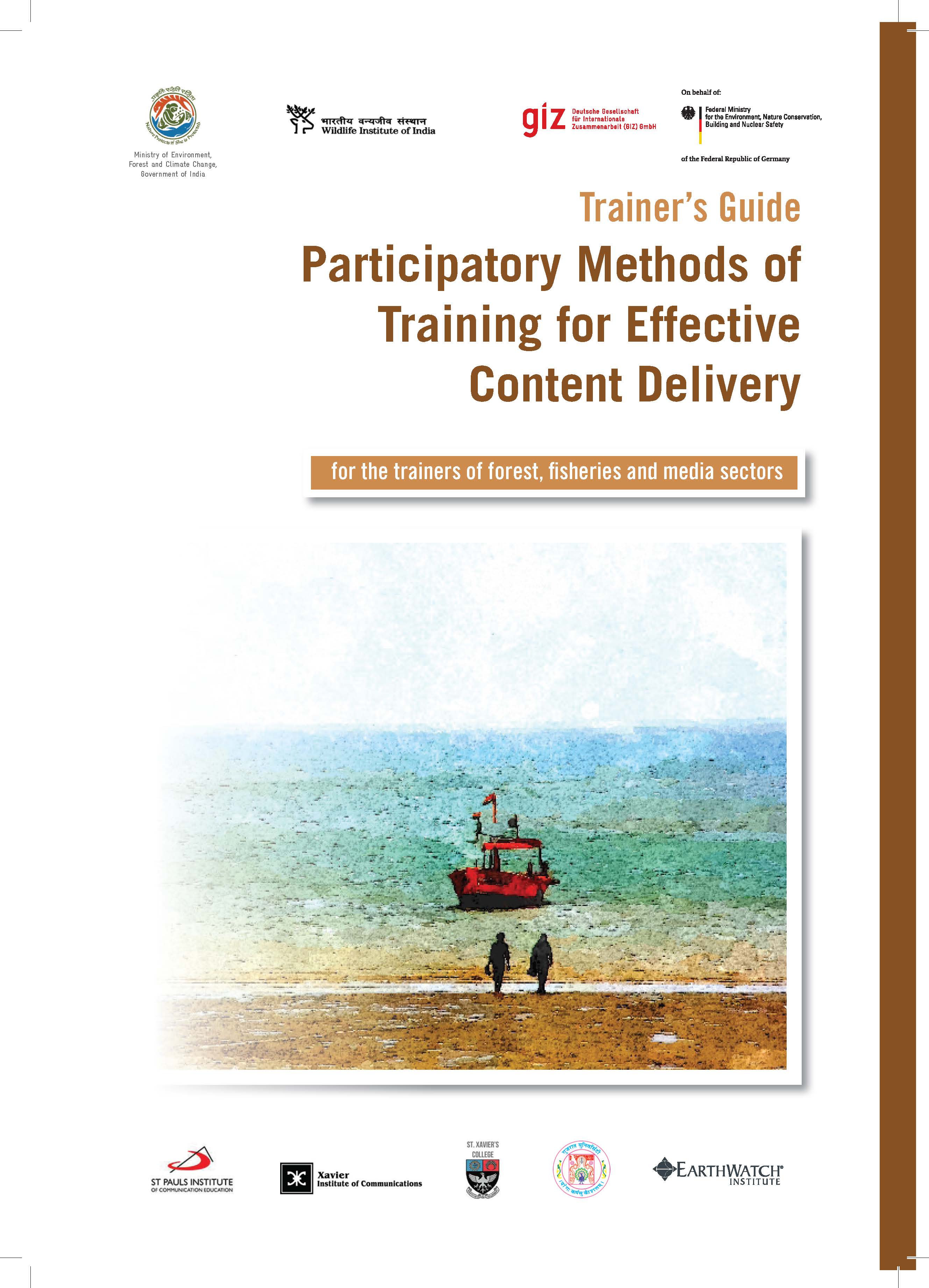
Trainer’s Guide: Participatory Methods of Training for Effective Content Delivery for the trainers of forest, fisheries and media sectors (2015): This trainer’s guide has been designed to facilitate trainers and experts of forest, fisheries and media sectors in delivering their courses and sessions effectively through the use of participatory methods. This guide serves as a compendium of selected participatory training methods, which are innovative, have been tested for their effectiveness, and are easy to be applied. The guide consists of four sections: The first section provides an overview of the concept of capacity development and the philosophy, the second section provides different training and learning concepts, third section provides a comprehensive list and an overview of various participatory training methods, and the fourth section provides methods for organizing successful field expeditions. The guide can be accessed here
English | Gujarati | Marathi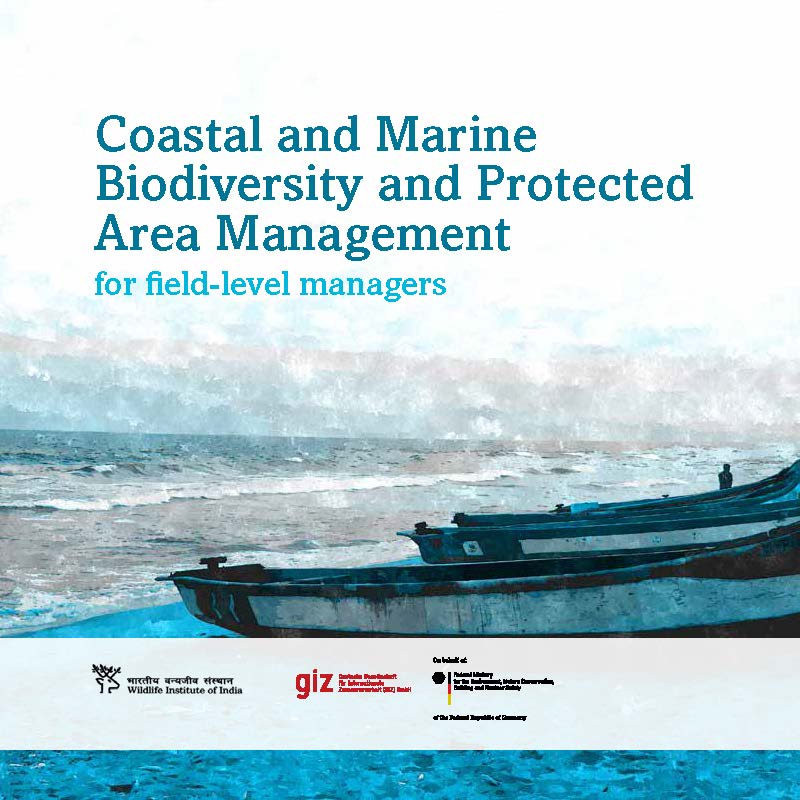
Training Resource Material: Coastal and Marine Biodiversity and Protected Area Management for field-level managers of coastal and marine resources (2015), is a modular training material, with eight modules, suitable for the field-level MPA manager's training in India for the staff of Forest departments as well as field-level staff of other relevant departments. Click here, for an overview of this training material in English, Gujarati or Marathi. Click on the respective language links for accessing detailed training material in
English | Gujarati | Marathi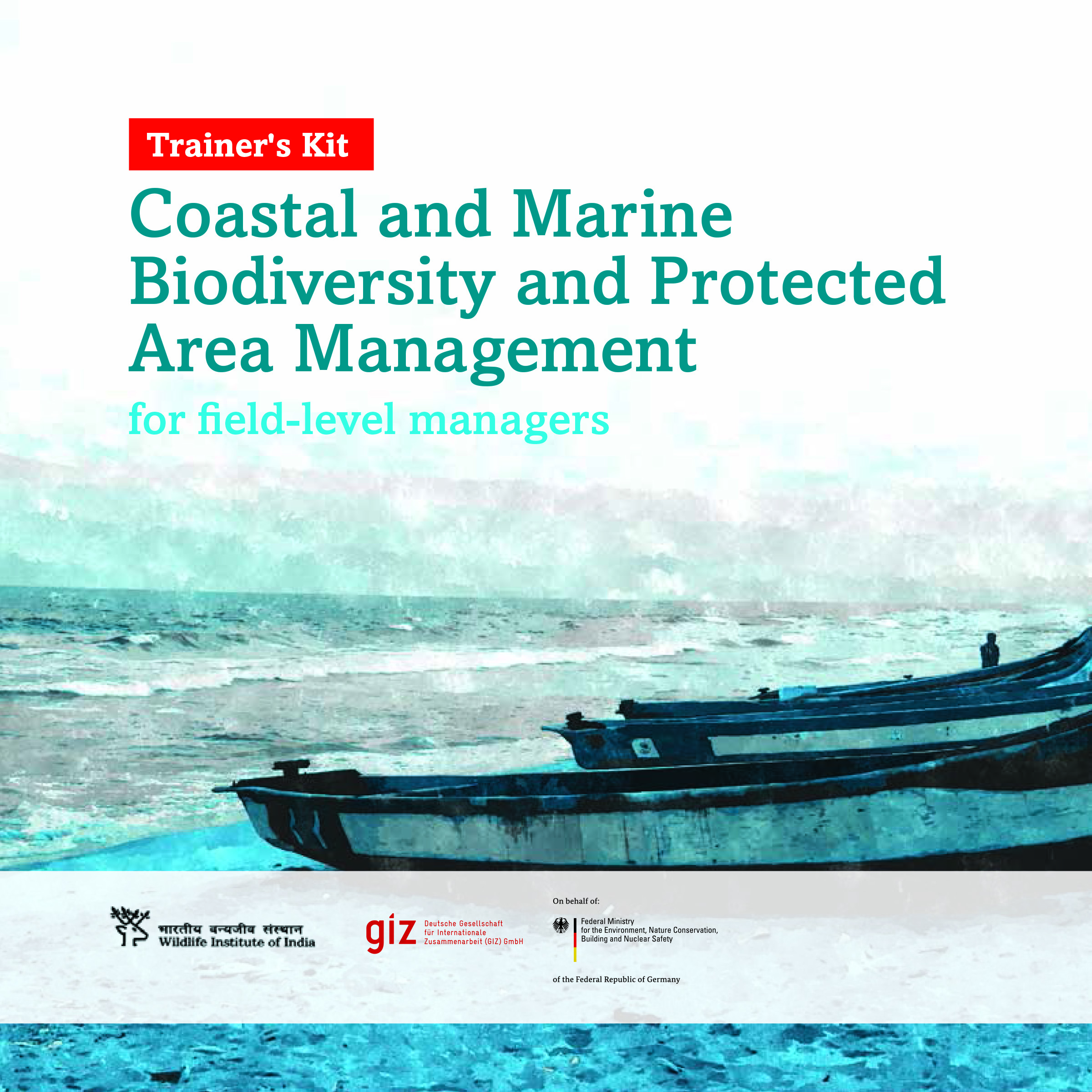
Trainer’s Kit: Coastal and Marine Biodiversity Conservation and Protected Area Management for Field-Level MPA Managers, Using participatory training methods (2015). This "Trainer's Kit" is useful for the faculty members, trainers and other experts delivering courses/ expeditions on "Coastal and marine biodiversity and protected area management" for the field-level managers. The Trainer's Kit contains the following: Training Resource Material (8 modules), Trainer’s Guide: Coastal and Marine Biodiversity Conservation and Protected Area Management for Field-Level MPA Managers, Using participatory training methods, and the Trainer’s Guide: Participatory Methods of Training for Effective Content Delivery for the trainers of forest, fisheries and media sectors. Click here to access the trainer’s kit.
English | Gujarati | Marathi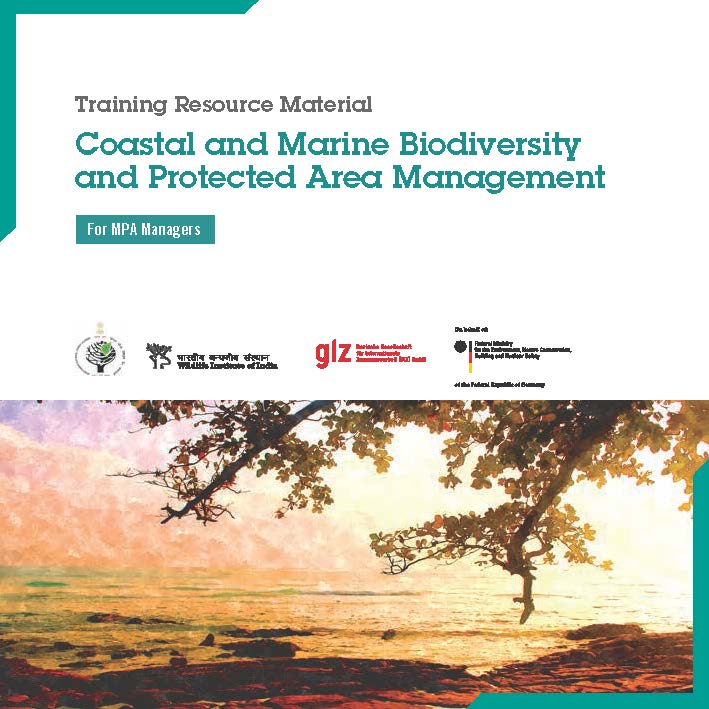
Training Resource Material: Coastal and Marine Biodiversity and Protected Area Management for MPA managers (2017): Indian Forest Service officers is a modular course, with 12 modules, and a “Field Learning Journal” suitable for the senior level officers. The course uses a competencies-based curriculum with a strong emphasis on field based exercises using participatory methods of training and learning. The training material is developed by a competent team of experts drawn from forest, fisheries and media sectors, bringing in a truly cross-sector perspective to the whole process of capacity development. . Click here , for an overview of this training material. Click on the respective language links for accessing detailed training material in English.
English | Gujarati | Marathi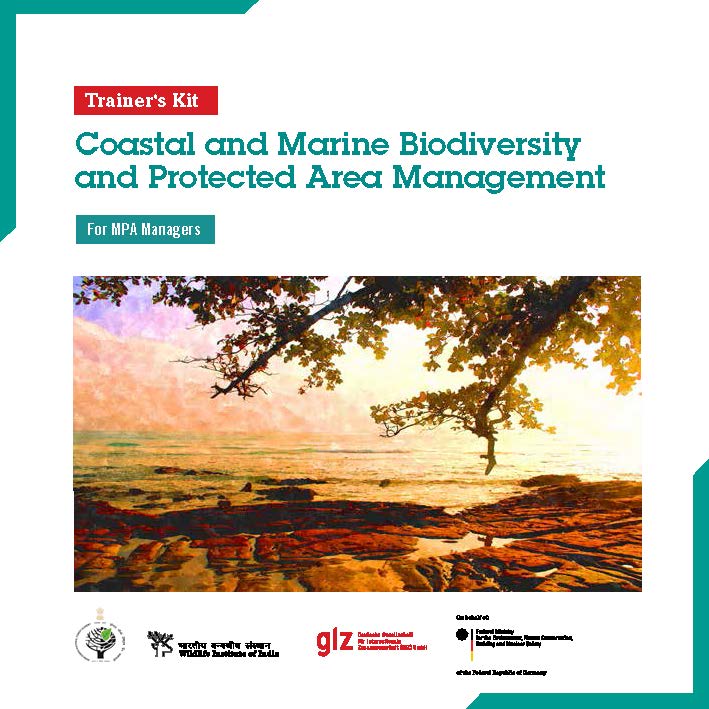
Trainer’s Kit: Coastal and Marine Biodiversity and Protected Area Management (2017). This "Trainer's Kit" is useful for the faculty members, trainers and other experts delivering courses/ expeditions on "Coastal and marine biodiversity and protected area management" for the senior IFS officers and officers from other departments/ sectors working on coastal and marine ecosystem issues. The Trainer's Kit contains the following: Training Resource Material (12 modules), the Trainer’s Guide: Participatory Methods of Training for Effective Content Delivery for the trainers of forest, fisheries and media sectors, and a “Field Learning Journal”. Click here to access the trainer’s kit.
English | Gujarati | Marathi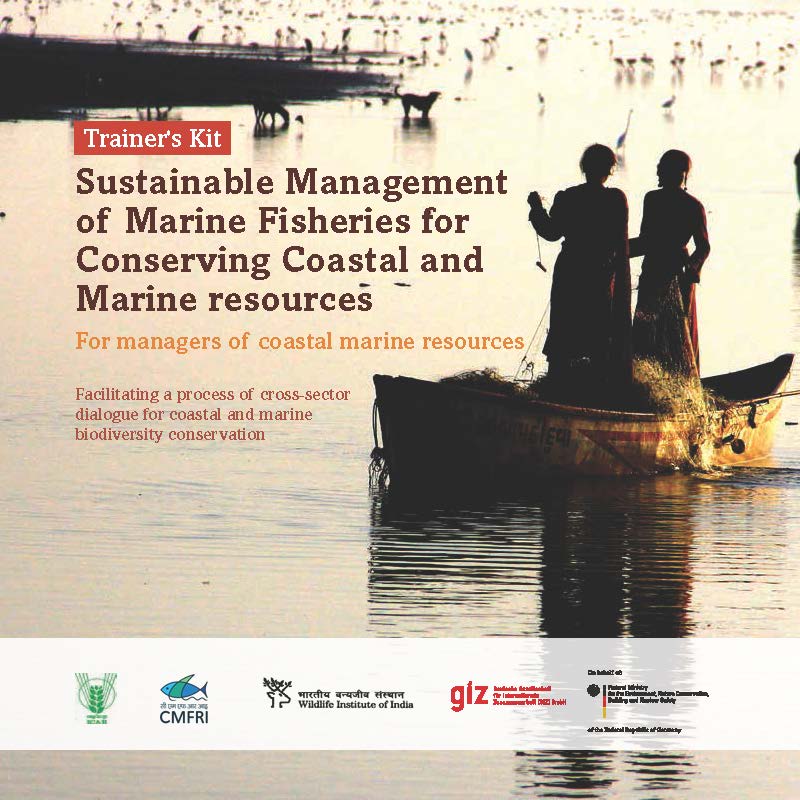
Trainer's Kit: Sustainable Management of Marine Fisheries for Conserving Coastal and Marine resources For managers of coastal marine resources: Towards Facilitating a process of cross-sector dialogue for coastal and marine biodiversity conservation, this "Trainer's Kit" is useful for the faculty members, trainers and other experts implementing Training Expedition on "Sustainable Management of Marine Fisheries for Conserving Coastal and Marine resources" for the field-level managers. The Trainer's Kit contains training Resource Material for MPA managers (8 modules), Trainer’s Guide: Participatory Methods of Training for Effective Content Delivery for the trainers of forest, fisheries and media sectors, and a “Field Learning Journal” for the participants. Click here for an overview of this material, and to access the complete Trainer’s Kit, click here.
English | Gujarati | Marathi
Coastal and Marine Biodiversity Conservation and Protected Area Management for the Indian Forest Service (IFS) Probationers: To ensure a long term and widespread impact of the capacity development measures and to mainstream coastal and marine biodiversity into conservation planning in India, it is imperative that this issue gets integrated in the training curriculum of the probationary officers of the Indian Forest Service. Keeping this in mind, the CMPA project of GIZ and the Indira Gandhi National Forest Academy (IGNFA) have designed specialized training measures for the IFS probationers, on coastal and marine biodiversity and MPA management. . Click here for an overview, and to access the Training materials, click here
English | Gujarati | Marathi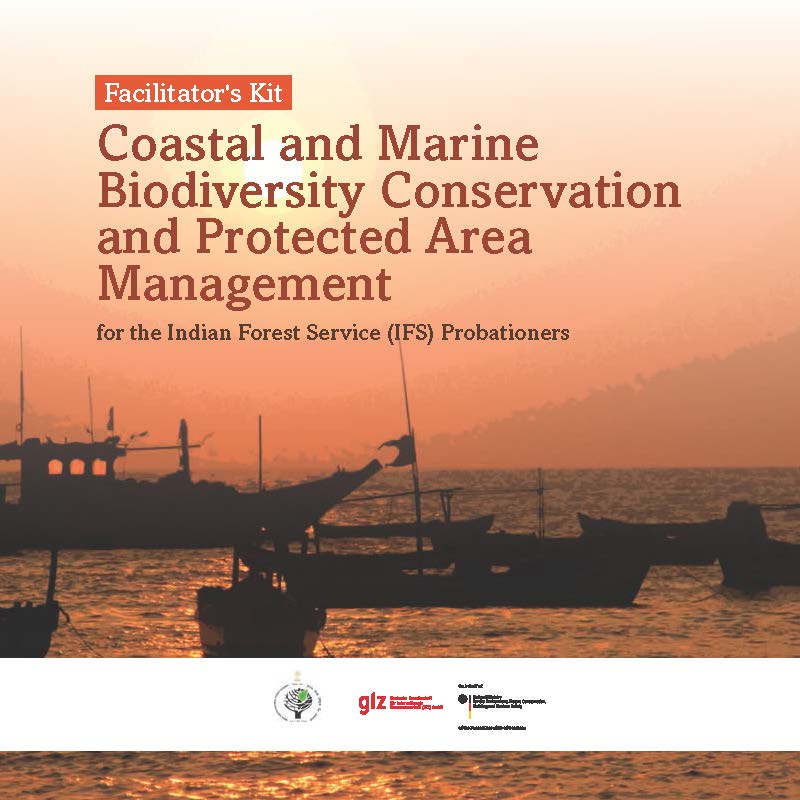
Facilitator's Kit: Coastal and Marine Biodiversity Conservation and Protected Area Management for the Indian Forest Service (IFS) Probationers (2017): This "Facilitator's Kit" is useful for the faculty members, trainers and other experts delivering courses/ training expeditions on "Coastal and marine biodiversity and protected area management" for the IFS probationers. The Facilitator's Kit contains the training resource material, field learning journal, a Facilitator’s Guide: Coastal and Marine Biodiversity and Protected Area Management for IFS Probationers, and the Trainer’s Guide: Participatory Methods of Training for Effective Content Delivery for the trainers of forest, fisheries and media sectors. Click here for an overview, and to access the complete Facilitator’s Kit, click here.
English | Gujarati | Marathi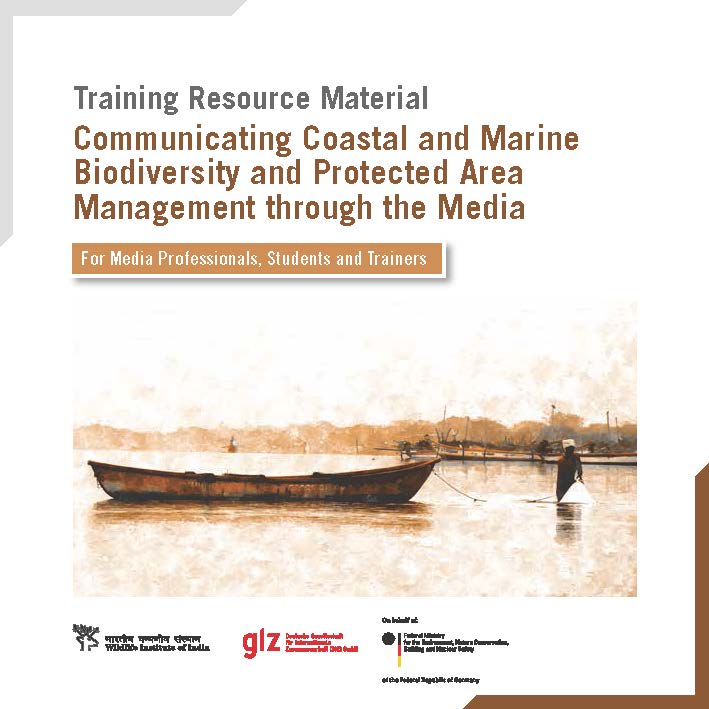
Training Resource Material: Communicating Coastal and Marine Biodiversity and Protected Area Management through the Media- For Media Professionals, Students and Trainers: This modular material, consisting of seven modules, is suitable for undergraduate and postgraduate media students at Indian media training organizations and universities, and for the media professionals. The training resource material consists of seven modules, and one “Field Learning Journal for Media”. Click here for an overview, and to access the complete set of Training Resource Material, click here
English | Gujarati | Marathi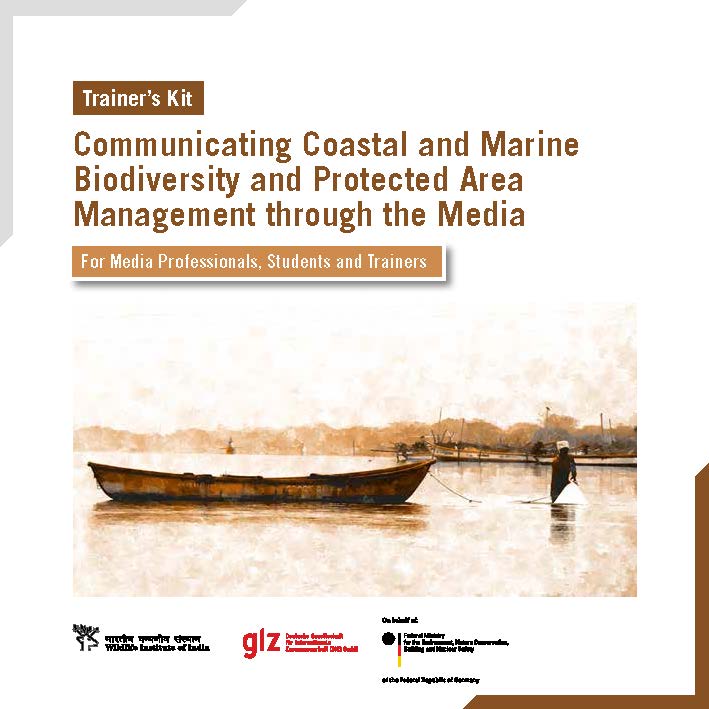
Trainer’s Kit: Communicating Coastal and Marine Biodiversity and Protected Area Management through the Media: This “Trainer’s Kit” is useful for the faculty members, trainers and other experts delivering courses/ expeditions on “Communicating Coastal and Marine Biodiversity Conservation and Management through the Media “ for media professionals or students. . The Kit contains the training resource material, Field Learning Journal for Media, a Trainer’s Guide: Communicating Coastal and Marine Biodiversity Conservation and Management Through the Media, Using participatory training methods, and the Trainer’s Guide: Participatory Methods of Training for Effective Content Delivery for the trainers of forest, fisheries and media sectors. Click here for an overview, and to access the complete Trainer’s Kit, click here.
English | Gujarati | Marathi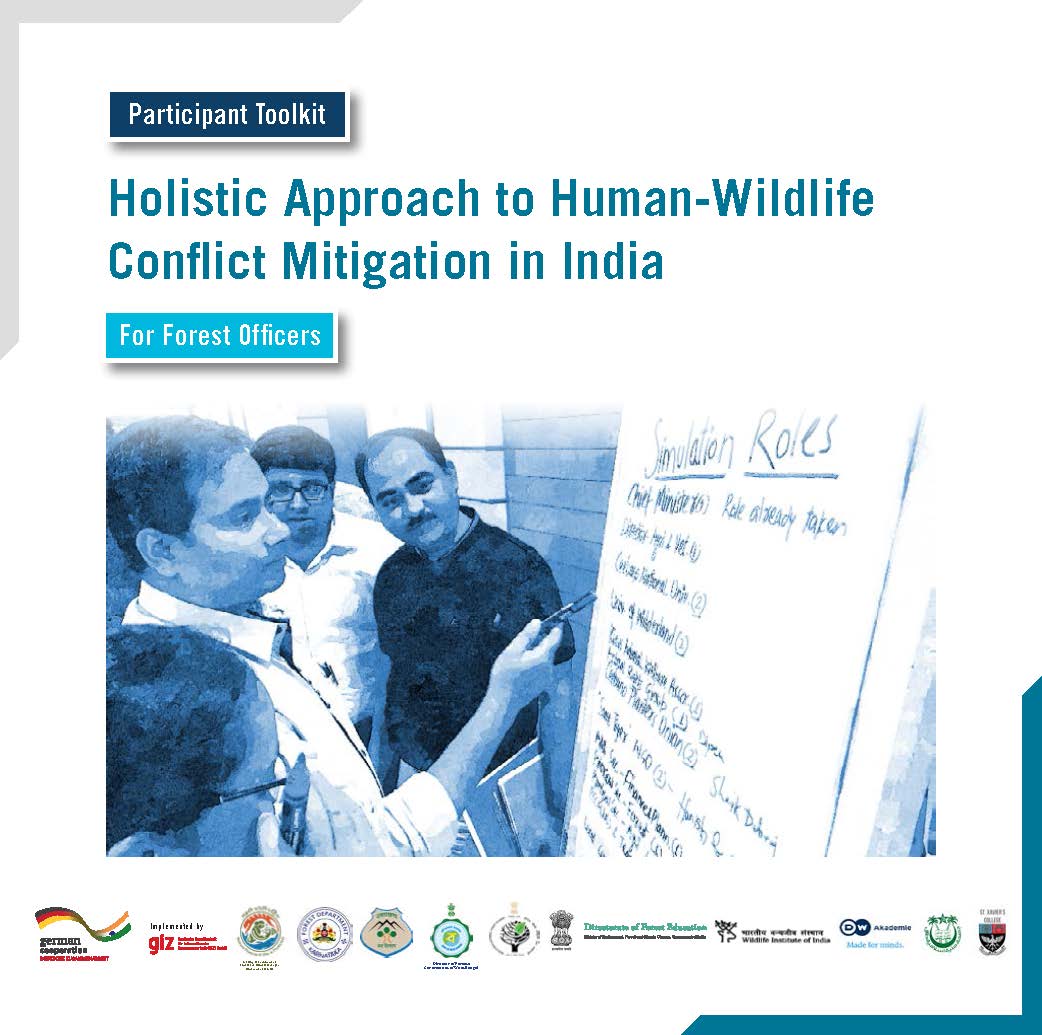
Participant Toolkit: Holistic Approach to Human-Wildlife Conflict Mitigation in India- For Forest Officers (2023): The trainings and courses based on this curriculum are intended to create a cadre of HWC mitigation professionals, implementing a holistic approach for bringing in enhanced effectiveness and efficiency in HWC mitigation measures in India. This curriculum is suitable for in-service as well as probationary forest officers of the Indian Forest Service and State Forest Services. The curriculum has been designed and updated, in alignment with the existing curriculum at the national and state-level training institutes in India. This curriculum has been designed for a stand-alone intensive course to be delivered over five-days, however, because of its modular structure and participatory training methods, it provides enough flexibility and can be customised for delivery over different durations.
Download the Overview booklet here. Detailed Training Resource Material can be accessed here
English | Gujarati | Marathi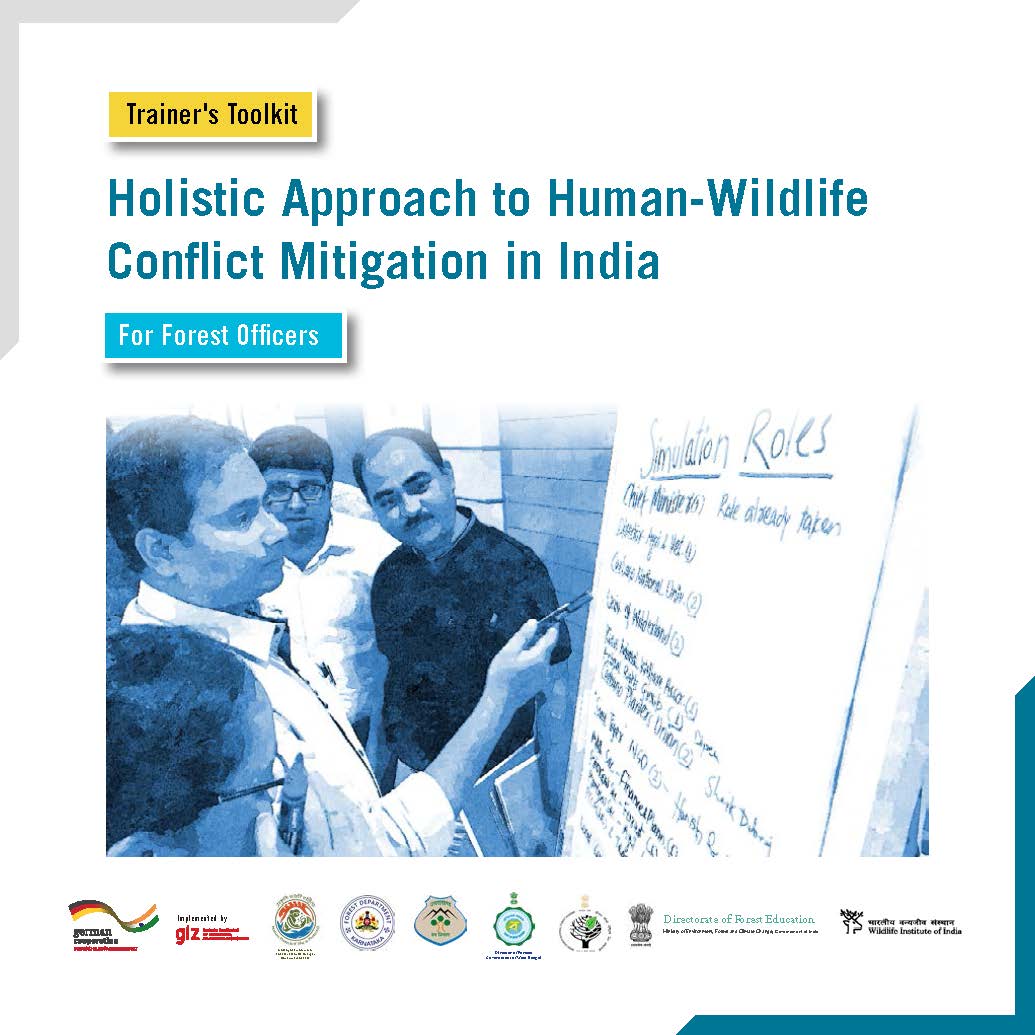
Trainer’s Toolkit: Holistic Approach to Human–Wildlife Conflict Mitigation in India for Forest Officers (2023): This Trainer's Toolkit is useful for faculty members and experts of forest training institutes, as well as wildlife experts facilitating workshops/training sessions. This Toolkit contains all the modules, the learning journal and a trainer's guide.
Download the Overview booklet here. Detailed Trainer’s Toolkit can be accessed here
English | Gujarati | Marathi
Training Resource Material: Holistic Approach to Human–Wildlife Conflict Mitigation in India for Rapid Response Teams and Frontline Officers (2023): The curriculum is designed for in-service as well as probationary frontline officers in the states, Indian Forest Service officers, veterinary and animal husbandry experts and frontline staff members of other line departments and agencies. The curriculum has been designed, field-tested and updated, in alignment with the Supplementary Framework to the HWC-NAP on "Establishment and Capacity Development of HWC Mitigation Response Teams". This curriculum has been designed for a stand-alone intensive course of nine training programmes to be delivered to each RRT. However, because of its modular structure and participatory training methods, it can be customised and delivered as a module in the regular training curriculum at national state-level training institutions over longer durations or during shorter field expeditions. A total of 11 training programmes based on this curriculum have been designed for RRTs, to create a cadre of professional Rapid Response Teams that mitigate HWC mitigation very effectively and efficiently.
Download the Overview booklet here. Detailed Training Resource Material can be accessed here
English | Gujarati | Marathi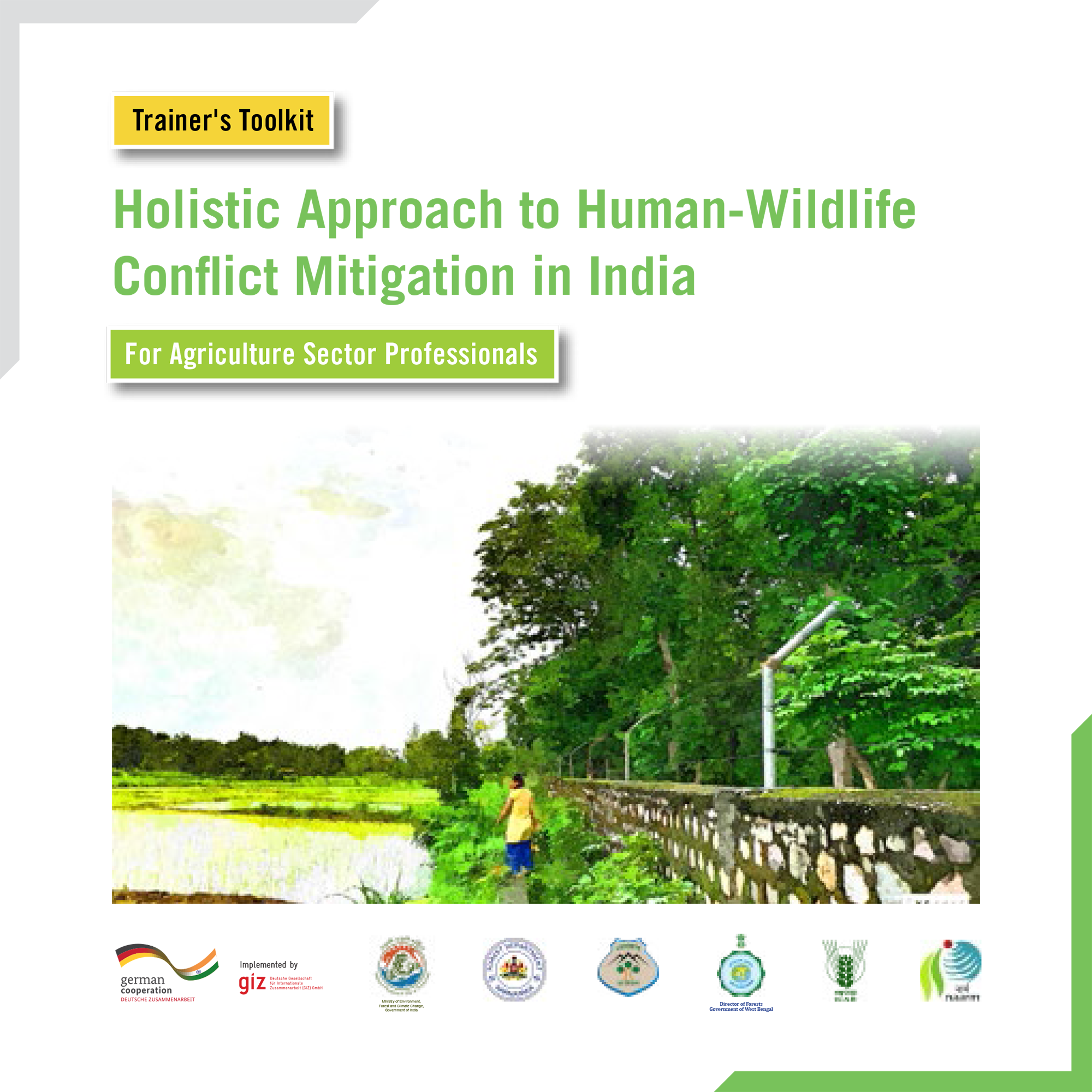
Trainer’s Toolkit: Holistic Approach to Human–Wildlife Conflict Mitigation in India for Rapid Response Teams and Frontline Officers (2023): This Trainer's Toolkit is useful for faculty members and experts of forest training institutes, as well as wildlife experts who facilitate training in HWC mitigation or One Health for Rapid Response Teams and other frontline officers and staff members of state forest departments and other line departments. This Toolkit contains all the modules, the learning journal and a trainer's guide.
Download the Overview booklet here. Detailed Trainer’s Toolkit can be accessed here
English | Gujarati | Marathi
Training Resource Material: Holistic Approach to Human–Wildlife Conflict Mitigation in India for Media Professionals and Students (2023): Training sessions based on this curriculum are intended to create a cadre of media professionals communicating holistically on human–wildlife conflict mitigation. This curriculum is suitable for undergraduate and postgraduate media students at Indian media training organisations and universities and for media professionals. This curriculum is designed to be a stand-alone course to be delivered over a semester for media students and an intensive 3-day training course for media professionals. Moreover, because of its modular structure and participatory training methods, it can be customised and delivered over longer/shorter durations. The curriculum can also be used to design field training expeditions for media professionals.
Download the Overview booklet here. Detailed Training Resource Material can be accessed here
English | Gujarati | Marathi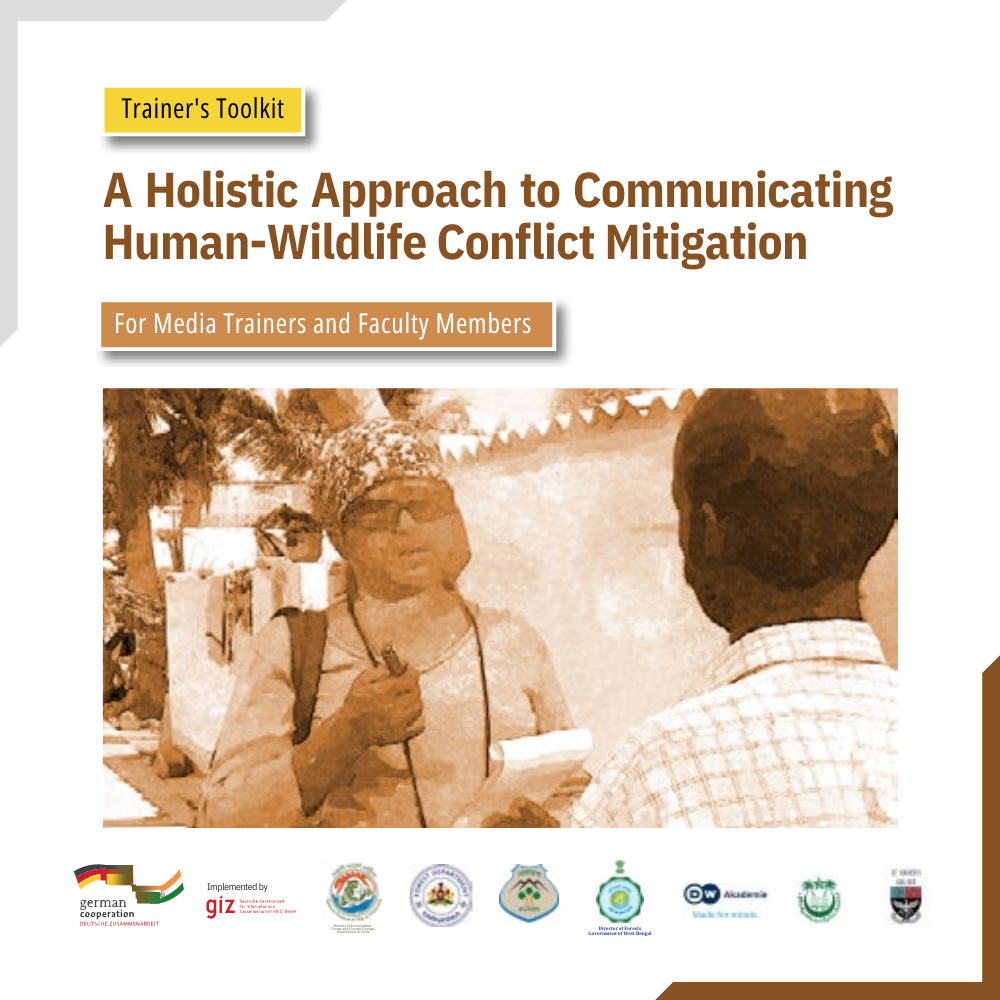
Trainer’s Toolkit: Holistic Approach to Human–Wildlife Conflict Mitigation in India for Media Trainers and Faculty Members (2022): This Trainer's Toolkit is useful for faculty members and experts of media training institutes as well as media professionals who facilitate workshops/training sessions. This Toolkit contains all the modules, the learning journal and a trainer's guide.
Download the Overview booklet here. Detailed Trainer’s Toolkit can be accessed here
English | Gujarati | Marathi
Training Resource Material: Holistic Approach to Human-Wildlife Conflict Mitigation in India for Community-level Primary Response Teams, Panchayats and Other Community-Based Institutions (2023): The curriculum is designed for the community-level Primary Response Teams. Moreover, the curriculum is also suitable for trainings on HWC mitigation and One Health for Panchayat members, members of other community-based institutions, women groups, and youth.
Download the Overview booklet here. Detailed Training Resource Material can be accessed here
English | Gujarati | Marathi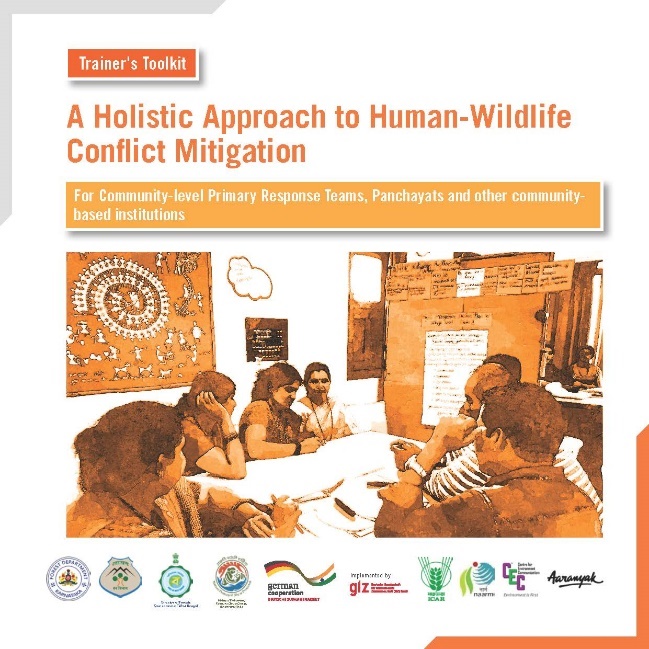
Trainer’s Toolkit: Holistic Approach to Human–Wildlife Conflict Mitigation in India for Community-Level Primary Response Teams, Panchayats and Other Community-Based Institutions (2023): This Trainer's Toolkit is useful for faculty members and experts of training institutes of the forest, agricultural and rural development sectors and Panchayati Raj Institutions, as well as community-based training institutions and NGOs, who facilitate workshops/training sessions on HWC mitigation or One Health for panchayats, community-level Primary Response Teams and other community-based institutions. This Toolkit contains all the modules, a training handbook, and a trainer's guide.
Download the Overview booklet here. Detailed Trainer’s Toolkit can be accessed here
English | Gujarati | Marathi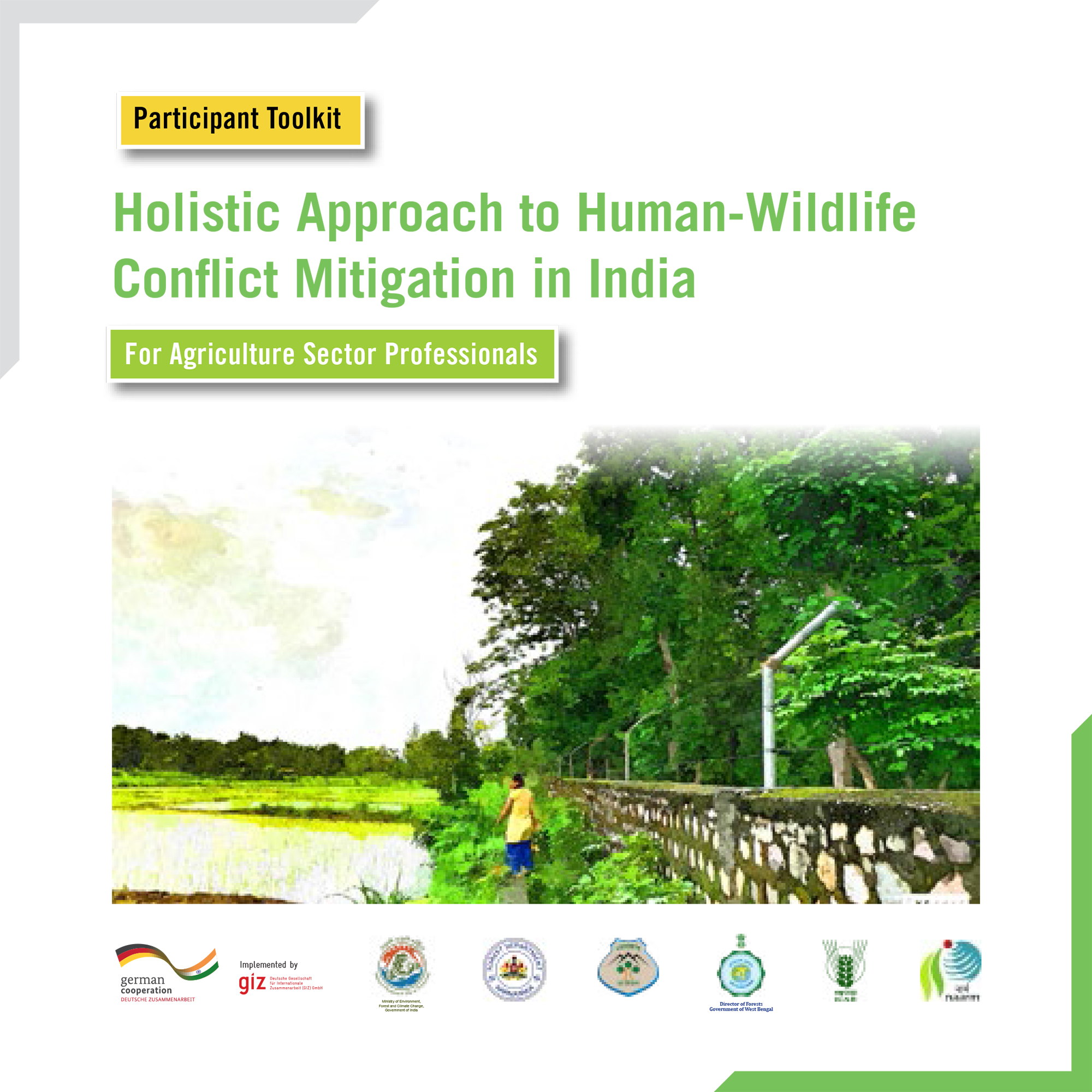
Participant Toolkit: Holistic Approach to Human-Wildlife Conflict Mitigation in India for Agriculture and veterinary professionals (2023): The training programmes and courses based on this curriculum are intended to create a cadre of HWC mitigation professionals from the agriculture, veterinary and animal husbandry sector, implementing a holistic approach for bringing in enhanced effectiveness and efficiency in HWC mitigation measures in India and working towards innovative crop protection and HWC-safe farming practices.
Download the Overview booklet here. Detailed Training Resource Material can be accessed here
English | Gujarati | Marathi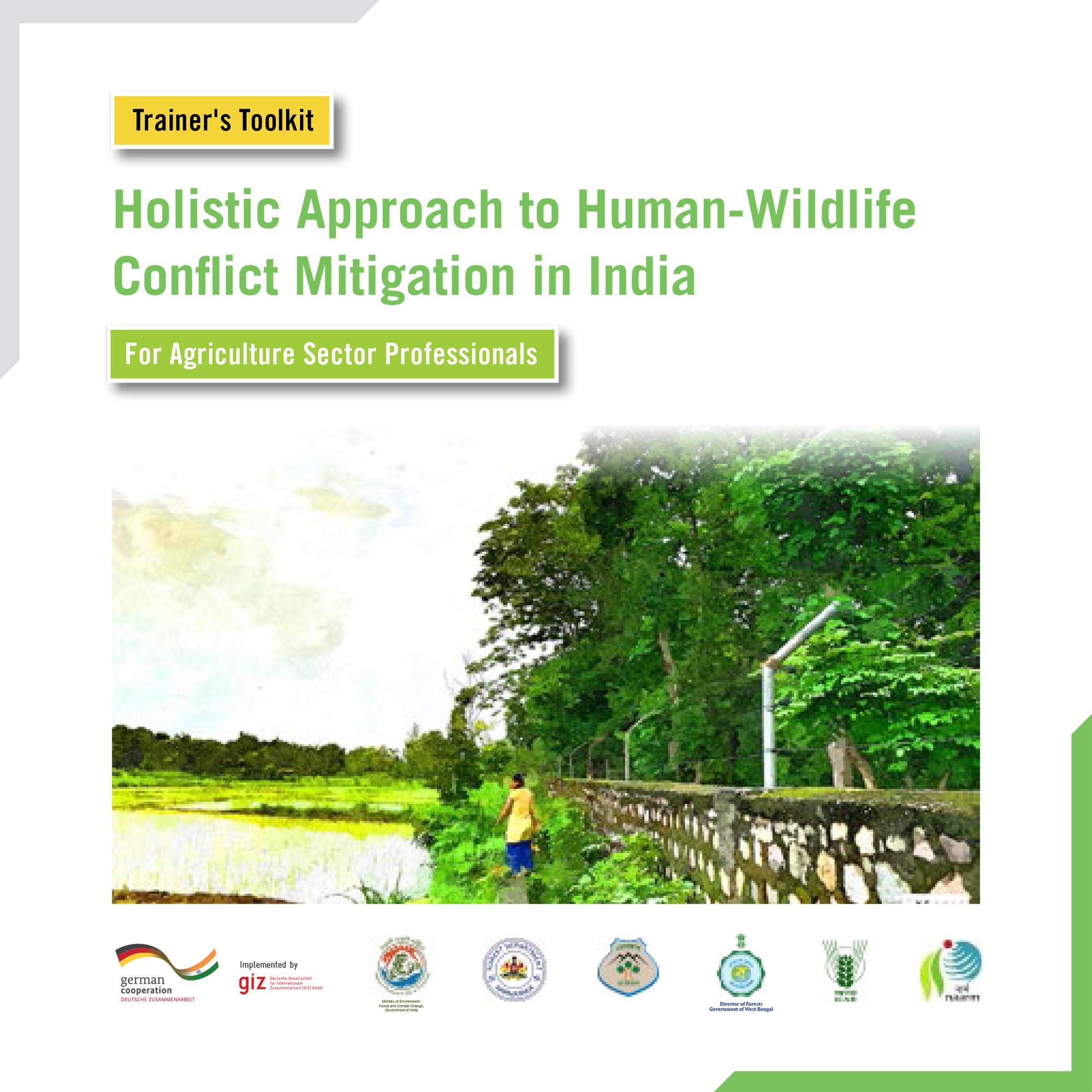
Trainer’s Toolkit: Holistic Approach to Human–Wildlife Conflict Mitigation in India for Agriculture and veterinary professionals (2023): This Trainer's Toolkit is useful for faculty members and experts of agriculture academies, State Agriculture Universities, other agriculture training institutes, KVKs, as well as for the agriculture sector experts facilitating workshops and training sessions. The kit contains all the training modules, a learning journal and trainer’s guide.
Download the Overview booklet here. Detailed Trainer’s Toolkit can be accessed here
English | Gujarati | Marathi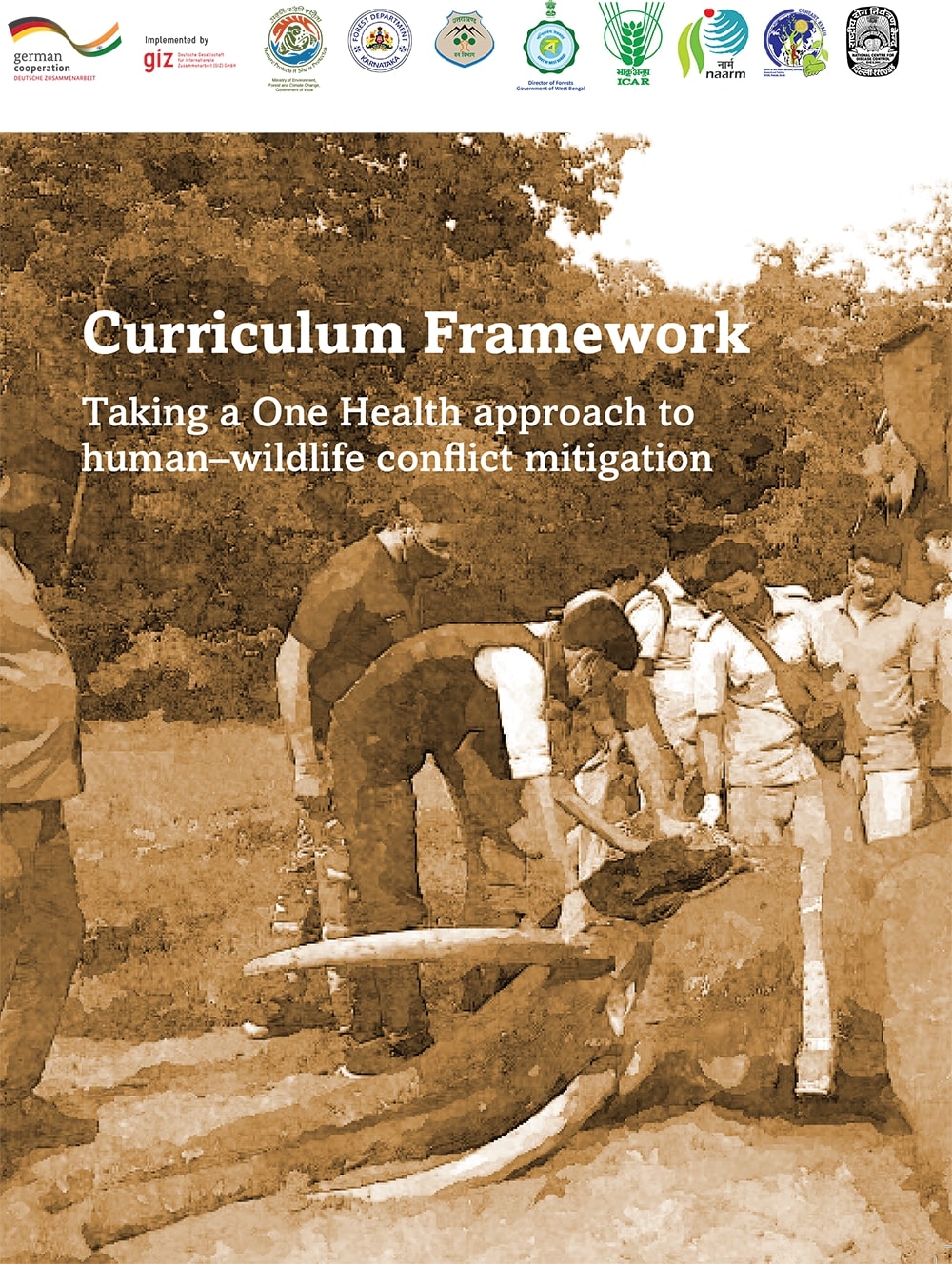
Trainer’s Toolkit: Taking a One Health Approach to Human–Wildlife Conflict Mitigation in India (2023): One of the most effective ways to integrate One Health approach in HWC mitigation and overall wildlife and protected area management in India is to invest in capacity development of key stakeholders, enabling them in co-creating effective and sustainable solutions for mitigating human–wildlife conflict taking a One Health approach. Access the publication here
This curriculum is designed such that it can be delivered as a five-day intensive training with cross-sector participation, five-day intensive training for the front-line staff with cross-sector participation, One-day training for panchayat members, farmers, women groups and other members/institutions of the local community, and a semester-long course/block training for graduate and postgraduate students of wildlife, veterinary, agriculture and public health institutions.
Download the Overview booklet here. Detailed Training Resource Material can be accessed here
English | Gujarati | Marathi© 2014 IGBP. All Rights Reserved.
Site By: Virtualpages
